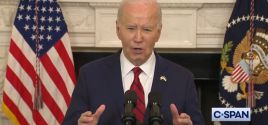Tourism slump worries USMoves are afoot to market America and regain valuable revenue from overseas visitors. By William Kay in Los AngelesThe Times Sep. 17, 2006 |
Popular 
Claim Jewish Student Was 'Stabbed In The Eye' by Pro-Palestine Protester Draws Mockery After Video Released

Senate Passes $95B Giveaway to Israel, Ukraine, and Taiwan, Combined With TikTok Ban

Biden Signs Bill to Give $95B to Israel, Ukraine and Taiwan, Ban TikTok

'These Protesters Belong in Jail': Gov. Abbott Cheers Arrest of Pro-Palestine Protesters at UT Austin

Mistrial Declared in Case of Arizona Rancher Accused of Killing Migrant Trespasser
 No one wants to go through the hellish so-called "security".CRYSTAL RESENDEZ was working in the Virgin Megastore in New York’s Union Square on the morning of 9/11, and vividly remembers crowds of people fleeing the World Trade Center covered in ash. Today Resendez, 30, is general manager of the store, next to Mann’s Chinese Theatre in Hollywood Boulevard, one of the hottest tourist spots on America’s West Coast. “There’s no doubt we’re still suffering much more than New York from the drop-off in foreign visitors,” she said. “The Union Square store is beating its sales records, but we’re definitely not.” Midwest accents seemed to dominate the throngs jostling around the freshly made hand and foot prints of actor Kevin Costner in the Chinese Theatre forecourt, but few of them were going into the Virgin store. “I think the recent bomb threat at Heathrow has had a big effect on visitor numbers,” said Resendez. “It seems to have affected the whole of Europe’s tourist decisions whether to come here.” Last Monday relatives of the 2,700 people killed in the Twin Towers gathered to commemorate the fifth anniversary of the terrorist attacks. At the same time, 1,000 leaders of America’s travel industry were preparing to fly to Washington for a much more hard-nosed event. On Tuesday evening they hosted 130 members of Congress at 30 dinners across the capital, a prelude to the launch of Discover America Partnership, a campaign aimed at reviving America’s ailing tourist trade. The US share of international travel has been falling since 1992, but the decline has accelerated since September 11, 2001. Since then America has lost an estimated $286 billion (£152 billion) in revenue from foreign tourists. While global travel has grown by a fifth, the the US travel industry’s share of the world tourism market has shrunk by a third, from 9% to 6%. “Tourism is booming around the world, and we’re not participating in it,” said Jay Rasulo, chairman of Walt Disney Parks and Resorts and a leading figure in the Discover America Partnership. Last year 49m people visited America, 1.5m fewer than five years earlier. But these figures disguise a u-shaped trend in which visitor numbers slumped for two years after the attacks in 2001 but have been climbing again since 2003. Ground Zero has proved a potent international magnet. New York expects an extra 500,000 international arrivals this year compared with 2005, when the 6.8m foreign visitors exactly matched the figure for 2000. But the West Coast, which has suffered no terrorist attacks, has had a drop in tourism. Last year Los Angeles had 2.5m foreign tourists, 1m fewer than in 2000. The question is why America is missing out. The immediate obstacle is the stricter security introduced since September 2001. Airline and hotel executives groaned last month at the new limits imposed on hand luggage after the bomb plot scare at Heathrow. The American tourist industry is painfully aware that many travellers are put off by the tough visa requirements and the hostile reception that can greet them at the country’s airports. “We’re not a welcoming country,” said Geoff Freeman, executive director of the Discover America Partnership. “Most countries ask people to come visit them. We have more of a fortress appearance.” Tough security measures are only part of the problem, however. Surveys show that America is becoming unpopular with the rest of the world, partly because of the Bush administration’s foreign policy. Since 2000 the percentage of people holding favourable opinions of the country has fallen from 83% to 56% in Britain, from 78% to 37% in Germany and from 77% to 63% in Japan. One plank of the Discover America Partnership is that when foreigners actually get to America, they take away a better opinion of it than those who have never been there. In July, Roger Dow, chief executive of the US Travel Industry Association, said: “Research documents the ‘perception boost’ that occurs when someone visits the United States and experiences our nation first-hand. Yet we do little to encourage international travellers to pay us a visit, while challenging entry requirements give travellers a reason to go somewhere else.” But it will take a huge marketing campaign to get that message across and tourism chiefs bemoan what they see as a lack of government support. “Other countries have publicly supported efforts to sell themselves,” said Rasulo. “By and large, we have abandoned the task of marketing America.” |



